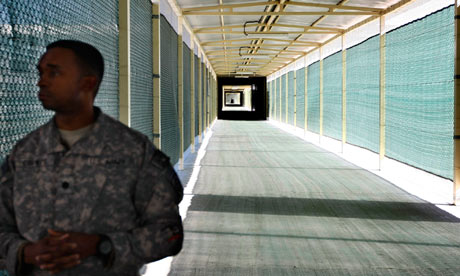For several decades, the US government -- in annual "human rights" reports issued by the State Department (reports mandated by the US Congress) -- has formally condemned nations around the globe for the practice of indefinite detention: imprisoning people without charges or any fixed sentence. These reports, said Secretary of State Hillary Clinton in her preface to last year's document, are grounded in the principle that "respect for human rights is not a western construct or a uniquely American ideal; it is the foundation for peace and stability everywhere." That 2011 report condemned numerous nations for indefinite detention, including Libya ("abuse and lack of review in detention"), Uzbekistan ("arbitrary arrest and detention"), Syria ("arbitrary arrest and detention"), and Iran ("Authorities held detainees, at times incommunicado, often for weeks or months without charge or trial").
In Afghanistan and Iraq, the US government is engaged in a fierce and protracted battle over the fundamental right to be free of indefinite detention. Specifically, the US is demanding that the governments of those two nations cease extending this right to their citizens. As a Washington Post article this morning details, Afghan President Hamid Karzai is insisting that the US fulfill its commitment to turn over all prisons, including the notorious facility at Bagram, to Afghan control, but here is one major impediment [emphasis added]:
"Afghan and U.S. officials have also disagreed on the issue of detention without trial. Washington wants the Afghan government to continue holding certain prisoners it views as dangerous, even if there is not enough evidence to try them.
"Aimal Faizi, the chief spokesman for Karzai, told reporters Monday that detention without trial is illegal in Afghanistan and that more than 50 Afghans are still being held in U.S. custody at Bagram, 35 miles northeast of Kabul, even though they have been ordered released by Afghan courts."



